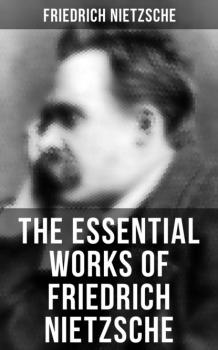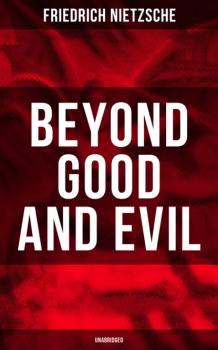Friedrich Nietzsche
Список книг автора Friedrich NietzscheThe Genealogy of Morals
"The Genealogy of Morals" traces the episodes in the evolution of moral concepts with a view to confront «moral prejudices», specifically those of Christianity and Judaism. Some Nietzsche scholars consider Genealogy to be a work of sustained brilliance and power as well as his masterpiece. Since its publication, it has influenced many authors and philosophers. "Ecce Homo: How One Becomes What One Is" is the last book written by Nietzsche before his final years of insanity that lasted until his death in 1900. According to Walter Kaufmann, Nietzsche's most prominent English translators, the book offers «Nietzsche's own interpretation of his development, his works, and his significance.» "Selected Letters" includes various personal letters by Nietzsche to his family and friends. Friedrich Nietzsche (1844–1900) was a German philosopher, poet, and Latin and Greek scholar whose work has exerted a profound influence on Western philosophy and modern intellectual history. Because of Nietzsche's evocative style and provocative ideas, his philosophy generates passionate reactions. His works remain controversial, due to varying interpretations and misinterpretations of his work. In the Western philosophy tradition, Nietzsche's writings have been described as the unique case of free revolutionary thought, that is, revolutionary in its structure and problems, although not tied to any revolutionary project.
THE TWILIGHT OF THE IDOLS & THE ANTICHRIST
"The Antichrist" is an attack on the «slave morality» and apathy of Western Christianity. Nietzsche's basic claim is that Christianity (as he saw it in the West) is a poisoner of western culture and perversion of the words of and practice of Jesus. "The Twilight of the Idols" criticizes German culture of the day as unsophisticated and nihilistic, and shoots some disapproving arrows at key French, British, and Italian cultural figures who represent similar tendencies. In contrast to all these alleged representatives of cultural «decadence», Nietzsche applauds Caesar, Napoleon, Goethe, Thucydides and the Sophists as healthier and stronger types. "Ecce Homo: How One Becomes What One Is" is the last book written by Nietzsche before his final years of insanity that lasted until his death in 1900. According to Walter Kaufmann, Nietzsche's most prominent English translators, the book offers «Nietzsche's own interpretation of his development, his works, and his significance.» "Selected Personal Letters" includes letters to his family and friends. Friedrich Nietzsche (1844–1900) was a German philosopher, poet, and Latin and Greek scholar whose work has exerted a profound influence on Western philosophy and modern intellectual history. Because of Nietzsche's evocative style and provocative ideas, his philosophy generates passionate reactions. His works remain controversial, due to varying interpretations and misinterpretations of his work. In the Western philosophy tradition, Nietzsche's writings have been described as the unique case of free revolutionary thought, that is, revolutionary in its structure and problems, although not tied to any revolutionary project.
The Gay Science
In «The Gay Science or, The Joyful Wisdom,» Nietzsche experiments with the notion of power. The book contains Nietzsche's first consideration of the idea of the eternal recurrence, a concept which would become critical in his next work Thus Spoke Zarathustra and underpins much of the later works. The book's title uses a phrase that was well known at the time. It was derived from a Provençal expression (gai saber) for the technical skill required for poetry-writing that had already been used by Ralph Waldo Emerson and E. S. Dallas… Excerpt: "A bad conscience is easier to cope with than a bad reputation." "Those who know that they are profound strive for clarity. Those who would like to seem profound to the crowd strive for obscurity. For the crowd believes that if it cannot see to the bottom of something it must be profound. It is so timid and dislikes going into the water." Friedrich Nietzsche (1844–1900) was a German philosopher, poet, and Latin and Greek scholar whose work has exerted a profound influence on Western philosophy and modern intellectual history. Because of Nietzsche's evocative style and provocative ideas, his philosophy generates passionate reactions. His works remain controversial, due to varying interpretations and misinterpretations of his work. In the Western philosophy tradition, Nietzsche's writings have been described as the unique case of free revolutionary thought, that is, revolutionary in its structure and problems, although not tied to any revolutionary project.
Also sprach Zarathustra
Ein ebenso viel diskutiertes wie umstrittenes philosophisches Werk der Moderne: Im Zentrum steht der persische Religionsstifter und Prophet Zarathustra, der sein in der Einsiedelei gewonnenes Wissen mit den Menschen teilen möchte. Als er jedoch den Bewohnern einer Stadt seine Idee des «Übermenschen» predigt, verhöhnt die Menge ihn. So wendet er sich in Form von Predigten und Gesängen nur noch an auserwählte Individuen und kritisiert dabei alle Lebensbereiche.-
The Essential Works of Friedrich Nietzsche
This carefully edited collection has been designed and formatted to the highest digital standards and adjusted for readability on all devices. Beyond Good and Evil The Genealogy of Morals The Birth of Tragedy or, Hellenism And Pessimism The Antichrist Thus Spake Zarathustra: A Book for All and None The Case of Wagner The Twilight of the Idols The Will to Power (Vol. 1&2) The Gay Science or, The Joyful Wisdom We Philologists Ecce Homo: How One Becomes What One Is The Greek State The Greek Woman On Music and Words Homer's Contest The Relation of Schopenhauer's Philosophy to a German Culture Philosophy During the Tragic Age of the Greeks On Truth and Falsity in Their Ultramoral Sense Collected Letters Friedrich Nietzsche (1844–1900) was a German philosopher, poet and Latin and Greek scholar whose work has exerted a profound influence on Western philosophy and modern intellectual history. Because of Nietzsche's evocative style and provocative ideas, his philosophy generates passionate reactions. His works remain controversial, due to varying interpretations and misinterpretations of his work. In the Western philosophy tradition, Nietzsche's writings have been described as the unique case of free revolutionary thought, that is, revolutionary in its structure and problems, although not tied to any revolutionary project. Some prominent elements of his philosophy include his genealogical critique of religion and Christian morality; the related theory of master–slave morality; the characterization of the human subject as the expression of competing wills, collectively understood as the will to power; and influential concepts such as the Übermensch and the doctrine of eternal return.
BEYOND GOOD AND EVIL (Unabridged)
In Beyond Good and Evil, Nietzsche accuses past philosophers of lacking critical sense and blindly accepting dogmatic premises in their consideration of morality. Specifically, he accuses them of founding grand metaphysical systems upon the faith that the good man is the opposite of the evil man, rather than just a different expression of the same basic impulses that find more direct expression in the evil man. The work moves into the realm «beyond good and evil» in the sense of leaving behind the traditional morality which Nietzsche subjects to a destructive critique in favor of what he regards as an affirmative approach that fearlessly confronts the perspective nature of knowledge and the perilous condition of the modern individual. Friedrich Wilhelm Nietzsche (1844-1900) was a German philosopher, cultural critic, poet, and Latin and Greek scholar whose work has exerted a profound influence on Western philosophy and modern intellectual history. Before turning to philosophy, he began his career as a philologist and worked at the Department of Classical Philology at the University of Basel, but he had to retire due to health problems. Nietzsche's body of writing spanned philosophical polemics, poetry, cultural criticism and fiction, and drew widely on art, philology, history, religion and science. His writing displayed a fondness for aphorism and irony, while engaging with a wide range of subjects including morality, aesthetics, tragedy, epistemology, atheism, and consciousness.









